Sara Jayne Townsend's Blog, page 37
May 19, 2012
My Life In Books: And Then There Were None
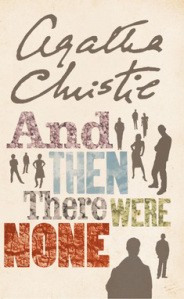 I don’t remember if this was the first Agatha Christie book I ever read, but it was certainly the first one to make an impact. I have a vague recollection that someone gave me two or three Agatha Christie books as a Christmas present, when I was 13 or 14, and this was one of them. I had already been attracted to mystery stories, from a very young age, but this one converted me into a life long crime & mystery fan.
I don’t remember if this was the first Agatha Christie book I ever read, but it was certainly the first one to make an impact. I have a vague recollection that someone gave me two or three Agatha Christie books as a Christmas present, when I was 13 or 14, and this was one of them. I had already been attracted to mystery stories, from a very young age, but this one converted me into a life long crime & mystery fan.
As far as I’m concerned, this book – Christie’s finest work – remains the masterpiece of the ‘whodunnit’ genre. Ten strangers end up together in a remote house on an island. One by one, they all start getting killed. No one can leave, no one else can get on the island, so the murderer has to be one of the ten. It’s revealed that each of the ten characters is hiding a dark secret, and they appear to have been invited to the island because someone wants to dispense justice for past crimes that have gone unpunished. But who is the murderer? The plot of this novel is so ingenious, when the police finally arrive they discover ten dead bodies and no clues as to who killed them all. In fact, the mystery is only solved when a letter in a bottle washes up on shore several weeks later, written by the killer, and explaining how the murders were done.
This book was first published in 1939 under the title of TEN LITTLE NIGGERS, an old children’s rhyme. In a more politically correct era, the title was changed to TEN LITTLE INDIANS and then AND THEN THERE WERE NONE, which was its title by the time I got my copy in the mid-1980s.
I did manage to find a battered paperback copy from 1949 with the original title recently, in a second hand book shop. Even though it wasn’t in very good condition, I decided it was a treasure worth buying.
I have an idea for a story about my amateur sleuth involving a reality show in a remote house because I really want to write an homage to this book. The problem is, as I soon realised, my book will be nowhere near as good as Agatha Christie’s, and the manuscript currently lies abandoned on the computer, halfway through Draft 1.
Come to think of it, I must make a point of re-reading this book at some point in the near future. It might inspire me to get back to the abandoned Shara Summers novel.

May 16, 2012
SOUL SCREAMS Book Trailer
(Cross-posted on WriteClub)
SOUL SCREAMS has a book trailer!
I must confess I’m a bit flummoxed by the concept of the book trailer. They seem to have risen with the e-book phenomenom. They do make a lot of sense. For the computer generation, who are accustomed to downloading and reading books on electronic devices, the concept of a multimedia presentation to entice a reader into buying a book, the same way a movie trailer is designed to entice you into the seeing the movie, or the preview at the end of the last episode of your favourite show teases you with the exciting bits of next week’s show, to ensure you come back for more, makes a lot of sense.
But I wouldn’t know where to begin to make a book trailer. Fortunately, the nice chaps at Stumar Press do know, and this is their creation.
So I am proud to present the SOUL SCREAMS trailer. I think it looks fab. What do you think?

May 12, 2012
Geek Games
I started playing Dungeons & Dragons in the 1980s, right at the height of its popularity. There was a D&D club at my high school. We used to play on Mondays, after classes, in one of the science labs. I was 15. I developed a crush on the DM (that’s Dungeon Master, for the uninitiated – the person who runs the game), who was a classmate of mine. Sadly, beyond the fact that we played D&D together every week, he barely knew I existed, and my affection was entirely unrequited.
I first met by husband 22 years ago, also through playing D&D. He, too, was my DM. Clearly I have a thing for DMs. I think it’s all about the power. The DM has god-like power, controlling the game and having final say over what happens to the characters. If you’re staring down a dragon and you fail all your saving throws, the DM has control over whether your character lives or dies.
We still play D&D, and my husband is still the DM. About once a month, generally on a Sunday afternoon, our dining room table becomes the games station, covered in coffee-stained character sheets, dice, lead figures, pencils, and snacks. Don’t forget the snacks. They are a vital part of table top role playing. The unhealthier, the better.
I have noticed that the vast majority of table top role players are my generation – those of us who grew up in the 70s and 80s when D&D was all the rage. The generations that have come after are more interested in the online role playing games than those that require dice, pencils and calculators. There’s also a trend amongst 13-year-boys nowadays for Warhammer, which seems to have come out of D&D, but is more about building an army big and powerful enough to smash your opponents, and less about strategy.
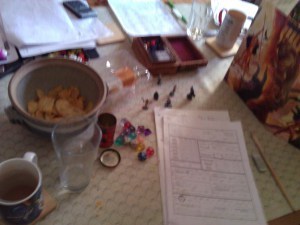
D&D Game In Progress
D&D is more than just combat. It’s also about strategy, decision making and role playing. And the role playing is a big part of its appeal. When you play a D&D character, you can become someone you’re not. It’s all about escapism. My current D&D character is a kick-ass warrior woman. She has incredible strength, she wears plate mail, specialises in the quarter staff and is a one-woman killing machine. She wades through the beasties smashing them to a pulp whilst barely breaking a sweat. The down side is, she really isn’t very bright. So when the group is discussing strategy, I sometimes have to remember to keep quiet. Sara might have this idea, but Hylla probably wouldn’t. Therefore I should stay in character and not vocalise it.
Playing a character that’s so far removed from me, though, is rather fun. And orc-bashing is a great stress reliever – almost as good as zombie slaying.

May 9, 2012
Finishing
(Cross-posted on WriteClub)
I was inspired to write this post by a friend who mentioned she has trouble finishing the stories she starts.
There are probably many reasons why many novels are started and not finished. My experience has led me to suspect there are two main suspects, which are the ones I’m going to deal with here.
1. You don’t know how it ends.
2. You spend so much time going back and editing the first draft, you never get to the second draft.
It took me 10 years to write SUFFER THE CHILDREN. I was citing life stuff getting in the way, but that was just an excuse, since I found time to write plenty of short stories during that 10 years. The real reason was the fact I got halfway through the book and didn’t know what was going to happen next, so I shoved it into a drawer. When I finally decided I wanted to finish this book, I knew I had to have a plan. I started by making a chapter-by-chapter outline of what I had so far. From there I worked on an outline of the whole story arc, all the way to the end. I ended up with three pages. I was then able to finish my chapter-by-chapter plan, because the story outline guided me as to what was going to happen in the chapters I hadn’t written yet. And from there, I was able to finish the novel.
It took me a while longer to learn this lesson fully. I’ve got a couple of other novels that were started and never finished, simply because I didn’t know how they were going to end. So now I don’t start a new novel without meticulous planning. I start with my three-page story summary. From there I do a chapter-by-chapter breakdown. This isn’t set in stone, and it might deviate a bit – I might, as I write, realise there’s another crucial event that has to happen between the events of chapter 11 and chapter 12, for instance, which might add a couple of extra chapters. But that’s OK. The system works for me, because every time I sit down to write, I know what’s going to happen next. My chapter plan is my guide.
Some writers are averse to too much planning, and swear by the ‘seat of the pants’ method. If this works for you, then I’m not criticising it. However, sometimes you can tell when a book has been written this way. If a novel starts off a certain way, and then suddenly, without notice, veers off in a completely different direction halfway through, it’s likely to have been written without a lot of forward planning.
If you are the sort of writer that has half-finished manuscripts gathering dust in your desk drawers, then maybe you should give the ‘planning’ method a try. It might help you finish one of them.
The second reason for not finishing, as cited above, is ‘over-editing’ the first draft. Again, this is largely down to writing technique. Some writers say they prefer to edit as they go, so by the time they get to the end of the first draft, there isn’t a need for a second draft. The problem with this method is, if you keep insisting on going over and polishing chapter 1 until it shines, you may never actually get to chapter 2.
Remember that old adage: Fix it in the rewrite. Remember also the words of Ernest Hemingway: the first draft is always shit ( well, I think it was Hemingway).
The point of the first draft is to erect the scaffolding on which the story is built. Who cares if it’s rubbish? No one’s going to read it. In fact, another successful writer, Stephen King, positively discourages writers from letting anyone see the first draft. In his marvellous how-to book ON WRITING (in my opinion the best ‘how to write’ book ever), he calls it ‘the closed door draft’. You write it without letting anyone in. When you get to draft 2 or 3, that’s when you can open the door and invite people to view it.
The first draft lets you get a feel for your characters and your plot. It lets you see where you still need to do the most work. But it should and will be flawed. Allow it to be so. Your secondary character Sue, petite and brunette, becomes blonde Alison halfway through? Don’t worry. Fix it in draft 2. You decide at chapter 20 there needs to be another character, but they ought to have been introduced in chapter 5? That’s OK. Just dump them in the story, and when you work on the next draft you can make a point of introducing this character earlier.
Of course, sometimes it’s hard to turn off the internal editor and just write, which is what I’m suggesting you do. I get up at 5:30am twice a week for my early-morning writing sessions, before work. I am not an early riser by nature. I find it a struggle to get up that early, and I stagger into London and sit in Starbucks for an hour, before going to the office. But that hour is very productive. I don’t think much about what I write. I just write. Maybe what I’m writing is rubbish, but it is first draft. And crucially, at that time in the morning, the part of my brain where my internal editor resides is still asleep, so she doesn’t interfere. And I think perhaps that’s why my early-morning writing sessions are so successful. It might be a different story if I was editing, but at the moment I’m just writing draft 1, and it’s working.
So these, in summary, are my two tips to get to the end. More planning, less editing. You can always fix it in the rewrite.

May 7, 2012
My Life in Books: Secrets of the Shopping Mall
 Teresa and Bernie are eighth-graders in a grim inner city junior high school, forging a friendship based on the common bond of being persecuted by the same bullies. When the bullies lock Bernie in his own locker, Teresa rescues him and the two decided they’ve had enough. With nothing waiting at home that’s much better than what they endure at school, they decide to run away. They pool the money they have to get on a bus and buy a ticket as far away as they can – Paradise Park, the driver tells them.
Teresa and Bernie are eighth-graders in a grim inner city junior high school, forging a friendship based on the common bond of being persecuted by the same bullies. When the bullies lock Bernie in his own locker, Teresa rescues him and the two decided they’ve had enough. With nothing waiting at home that’s much better than what they endure at school, they decide to run away. They pool the money they have to get on a bus and buy a ticket as far away as they can – Paradise Park, the driver tells them.
Paradise Park turns out to be a shopping mall. Having no more money, the pair are stranded, but they discover that they can reside undetected in the shopping mall, surviving by stealing food at night and mingling with the shoppers during the day. They also soon discover that they are not the only residents of the shopping mall. At night a group of displaced orphans move around the shopping mall, having learned the art of posing as mannequins during the day, unmoving for hours.
Richard Peck wrote a lot of creepy books for teenagers, in the days when ‘Young Adult’ was only just emerging as a genre. I discovered this in my school library in my early teens. The reason I remember it so clearly is because I read it at Christmas. As an young teen I was still excited about Christmas (I’ve become rather more cynical about it in recent years), so I went to bed with a book on Christmas Eve, reading late into the night until I was tired enough to fall asleep. This was the ‘bedtime reading’ book for Christmas Eve 1982 or 83 – can’t remember which.
What I do remember, very clearly, is the unease and genuine creepiness of this book underscored by the festive cheer and excitement of Christmas – a strange combination – as I read it. But I don’t actually remember what happened at the end of this book, or what happened to Bernie and Teresa.
The book, it appears, is still in print, with this same cover that featured on the copy I read (check out those dodgy 80s fashions and hair styles). Maybe I should re-read it.

May 2, 2012
Faith
(Cross-posted on the WriteClub blog)
I’ve talked a lot on this blog recently about negative feelings writers endure. Fear. Jealousy. Mood swings. It’s time to talk about something more positive. Today I want to talk about faith. Faith in yourself. Self-belief in your work as a writer.
It’s quite a difficult one, this, because there’s a fine balance between self-deprecation and arrogance. I’ve encountered both over the years. The first is that very promising and inherently talented writer who suffers from such low self-esteem that they believe everything they write is rubbish. They might have a literary masterpiece tucked away in their desk drawer, but no one will ever know because they never let anyone read any of their work, for fear of rejection.
Then there is the type of person who believes themselves to have talent that surpasses everyone else out there. They are the best writer that ever lived – if only someone would recognise their genius. Such people tend to be deluded as well as arrogant, as generally their writing is average at best, but they won’t hear any kind of criticism and often write angry letters to the agents and editors who have the audacity to reject them.
These are two extreme examples, of course. Most of us fall somewhere in the middle. Maybe not literary geniuses, but not bad writers at all, and we lurch between feeling pretty good about what we’ve written and believing it to be a big steaming pile of poo.
But this is where faith comes in. Believe in yourself. Believe in your writing. Maybe you’re a beginner writer and you feel you’ve got a lot to learn. That is probably true. But keep reading, and keep writing. Talk to other writers. Go to conventions and conferences. Let more experienced writers crit your work, and take on board what they tell you. Your writing will improve all the time. And one day you will get published. Have faith.
Maybe you’re already a published author but you have lost your way in your latest work. Maybe you think you’ve lost the muse, and you worry that you’ll never write anything of publishable quality again. Have faith. Somebody thought your writing good enough to publish. Why would that go away? Nobody becomes a great writer overnight, but nobody becomes a rubbish one, either.
Keep the faith, my writer friends. And believe in yourself.

April 30, 2012
Monday’s Friend: Jenna Jaxon
Today I am pleased to welcome romance writer Jenna Jaxon to the blog.
Make A Plan, Stan!
Getting the Most Out of Your Writer’s Retreat
By Jenna Jaxon
I’m gearing up, making a list and checking it not twice but three times, making sure I’ve got everything I need. Not clothes and toothpaste (though those come along too, naturally). Writer’s stuff. In just about a month I’m meeting about 25 other writers at a conference center out in the middle of Nowhere, Virginia for four fantastic, uninterrupted days of writing. I’m so psyched with anticipation I feel as if I’m getting ready to leave the country. And in some ways I am.
Laptop, check. Extension cord, check. Paper and pens (in case the lights go out). That’s about it. No! Wait! I’ve got to bring the most important ingredient–ideas. This item is definitely the tops on the list and sometimes the most illusive thing a writer must bring. It’s never been my main concern. My ideas are crammed into my brain so full my biggest problem is deciding which one to work on at the upcoming retreat. Which leads me to the focus of this post: to get the most out of your retreat, make a plan.
Last year was my first retreat and though I loved it, I could have done so much more, had I created a plan and stuck to it. I’m definitely doing that this year and hope to double my productivity. These are some tips you might want to try when preparing for your retreat.
1) Do research. Research the location. Get good directions. One major challenge last year was simply finding the place. I wasted probably two hours trying to find the conference center–and I had directions! So if you know others who are going, caravan. Print out directions from different sites, like Mapquest and Google Maps. If one fails, check the other. And have a phone number handy so you can be talked in (yes, my retreat is that far out in the boonies!)
Also find out the itinerary. Is the retreat offering workshops? Group meals? Will you have to cook? All these things will impact your writing time. Make sure you take them into consideration.
2) Say good-bye to the Internet. My biggest mistake last year was trying to keep up with my emails and blog posts during the retreat. Put your loops on digest. Pre-set your blog posts. Don’t let yourself get distracted from the reason you are there–to write. If you must do research (as I must, because I write historicals and I know you even need to look stuff up for contemporary works), keep it to a minimum. Don’t cheat and go off to visit your emails. They will be there when this is all over.
3) Make a list of what writing projects you want to work on. Don’t wait to get to the site to decide. Arrive knowing that you are going to work on X, Y, and Z with a goal of X amount of words or pages. This will help you focus and keep you on track throughout the weekend. This step may be my biggest challenge this year. I have three WIPs that I want to work on, so I’m having trouble deciding which one to give precedence to. One solution might be to work on one each day, or for a set amount of time. I’m just not sure how well that would work for me. If I get into my “zone” and the words are flowing, I wouldn’t stop and switch gears just because my time was up. But as everyone works differently, these suggestions may well work for others.
Last year I wrote a blog post, an 18 page short story, a detailed outline for a Regency romance, and completed two chapters of my then WIP Victorian romance. In all, about 50 pages. I’m hoping to do so much more this year, once I figure out what I’m going to do.
Have you ever been to a writer’s retreat? What was your experience, good or bad? I’ll giveaway a copy of my contemporary erotic novella, Hog Wild, to two commenters drawn at random.
I want to thank Sara-Jayne for this opportunity to guest on her blog and to tell you about my special request for the month of May.
My contemporary erotic novella, Almost Perfect, is part of Decadent Publishing’s 1Night Stand series and has been chosen as their Read For A Cure book for the month of May. All publisher proceeds from Almost Perfect during the month will be donated to Relay For Life. So if you’re in the market for a short, spicy deserted island love story, consider downloading Almost Perfect in May.
Blurb for ALMOST PERFECT:
Pamela Kimball’s birthday present, a 1Night Stand adventure, promises jump-start her life, put a new man in her bed, and help her forget her past. Unfortunately, movie-buff Pam’s Pirates of the Caribbean fantasy takes an alarming wrong turn when she’s abandoned on a not quite deserted island—with ex-husband Roger Ware.
Forced by hunger to accept Roger’s offer of dinner, Pam realizes the geek she married has transformed into one of the most charming, sexiest men she’s ever met. His newfound confidence—and hot body—re-kindles old fires. A simple kiss leads Roger to challenges her to discover how much his lovemaking skills have improved, leaving Pam torn between self-preservation and burning desire.
With time running out before they’re rescued, Pam must decide if her heart can survive the consequences of becoming Roger’s “almost” perfect 1Night Stand.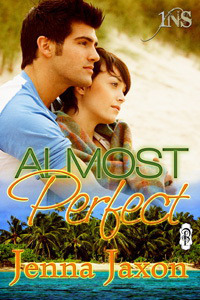
Excerpt:
She inched into the lapping surf, searching for movement. Reflection off the water made this task harder than expected. Wasn’t the Caribbean supposed to be teeming with fish? Now that’s something she’d had a lot of instruction in. Almost every marooned-on-an-island movie had a scene where the heroine learned to catch fish. Six Days, Father Goose, Blue Lagoon. All you needed was your hands and patience. She could do this.
Pam waded out further then stopped just before the water hit her now dry shorts. “Not gonna to have a damp crotch all night.” The words reminded her of exactly what she had hoped for tonight. “But not from wet shorts!” She headed back to shore to remove and drape them next to her shirt. The bandeau was a different story. Still damp, even after several hours, and uncomfortable. Might dry better if not next to her skin anyway. “Screw it! Live dangerously.”
Standing as good as naked on the deserted beach, Pam smiled as the warm breeze caressed her bare body. The sense of being slightly naughty added to her delight in the sensual feel of the air as it dried her breasts. Her nipples peaked as the wind cooled them. She strutted down to the water’s edge to sink her toes in the sand, the salty tang in the air adding to the perfect moment.
“If you’re skinny dipping, you forgot to remove one very important piece of clothing.”
Pam whirled around. Roger stood on the beach behind her, a green bottle of Perrier in one hand. His gaze played up and down her naked torso and his salacious grin widened. “Mind if I join you?”
Buy ALMOST PERFECT from the following places (please buy in May to benefit Relay for Life):
* * * *
Jenna Jaxon is a multi-published author of historical and contemporary romance who has been reading and writing historical romance since she was a teenager. A romantic herself, Jenna has always loved a dark side to the genre, a twist, suspense, a surprise. She tries to incorporate all of these elements into her own writing.
Jenna lives in Virginia with her family and a small menagerie of pets. When not reading or writing, she indulges her passion for the theatre, working with local theatres as a director. She often feels she is directing her characters on their own private stage.
She has equated her writing to an addiction to chocolate because once she starts she just can’t stop.

April 25, 2012
Writing Processes – Part 17: A Matter of Routine
(Cross-posted on the WriteClub blog)
I’ve talked before about my dislike of exercise. I’m not one of those people who enthusiastically embraces her gym sessions because she enjoys the adrenaline buzz. I go because I feel it’s a necessary part of a healthy lifestyle. I really don’t enjoy it, and I enjoy less the fact that I struggle to climb stairs for three days afterwards.
But because exercise is good for me, I endeavour to make time for it. And the only way it works for me is if I schedule it into my calendar. I have to set recurring appointments, so I get a reminder coming up on my calendar telling me about my commitment. Somehow this makes me more inclined to go. If I delete exercise sessions from my calendar, I feel guilty.
The same can be said about making time to write. This topic is much blogged about, both here and elsewhere. None of us have enough time to do everything we want to do, and when you’re trying to fit writing in around the day job, it does feel like you’re working two full time jobs.
I now schedule my writing time into my calendar the same way I schedule in my exercise classes. Monday evening is the ‘Million Monkeys’ initiative, where writers are invited to gather at the Royal Festival Hall on London’s South Bank, sit down with their laptops and start writing. It’s all very informal and very much a ‘drop-in session’, but I find that when I do go, I get quite a lot done. Maybe it’s the collective creative vibe. Maybe it’s the fact that when I am sitting amongst a group of others who are all furiously typing away, progressing on their WIPs, I feel more inclined to get on with mine. So I now schedule this event into my week as often as possible.
I also schedule two ‘writing mornings’. Generally Wednesdays and Fridays, I will get up at 5:30am and get the extra early train into London. This gets me to the Starbucks round the corner from work by 7:30am. I sit there with a soya latte and a ginger muffin, in my usual seat, and I will write for an hour before going to the office. My breakfast there rarely changes, and neither does where I sit. But this is all part of the routine. For me, the routine works. If I expect to be doing something at a particular time, on a particular day, I’m more likely to do it. And if someone’s in my usual seat at Starbucks and I have to sit somewhere else, I don’t get nearly as many words written.
I think for writers, routine works. But it’s equally important to find a routine that works for you. Don’t like getting up early? Neither do I, but strangely I’ve found that now I’m the wrong side of 40, getting up early to write is actually preferable to staying up late. You might be the sort of writer that finds you’re at your most productive at 2 in the morning. That’s fine, but if you’ve got a day job as well, that might be hard to manage unless you can cope without much sleep, or you can negotiate with your boss to start a bit later some days. Some people write during their lunch hour. I find the whole business of trying to eat my lunch and write at the same time a bit distracting, and I’m not a person that can go without lunch, so I don’t that myself. But if it works for you, then great.
Some people maintain that if you want to be a serious writer, you should write every day. Sound advice, if you can manage it, but I was only getting myself very stressed trying to fit in writing every day. My writing mornings are now recurring events in my calendar. In general, I will only delete them if I’m having a day off work and am not going into London, but if that’s the case then I will try and schedule another writing session later in the week – or I will endeavour to fit in some writing at home. If I manage to get extra writing time in then that’s a bonus, but at least I know that if I follow my usual routine, then I will have at least three writing sessions in a week.
There are no hard and fast rules when it comes to the ‘best’ times for writing. You must make time, no doubt about that – a lot of people will talk airily about wanting to write a novel, but “never having the time”. You can talk about it, or you can do it. There might be a lot of trial and error before you find what works for you. But once you do find something that works, make it part of your routine.
Most writers I know are creatures of habit. So work on developing the habits that make you a better and more productive writer.








April 18, 2012
SOUL SCREAMS Comes To Life!
(Cross-posted on the WriteClub blog)
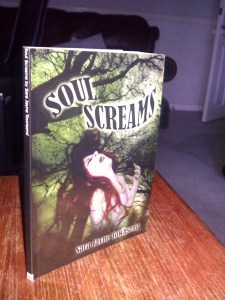
When my first novel SUFFER THE CHILDREN was published, the whole process was one thrill after another. The first time I saw the cover. The first (and second, and third) occasion I had a reason to say “I have to email my editor”. Every round of edits was exciting.
And then the complete published novel arrived, in the form of a zip folder containing all the available e-book formats it was available in. That was an incredibly exciting moment – knowing that my novel was Published. I got so excited I tried to open all the files at once and crashed the machine. There was no hard copy, it was e-book only, but it was thrilling nonetheless.
SOUL SCREAMS is the first of my books that is being made available as a print version, and this means there’s been a new round of ‘first time thrills’. The first time I saw a JPG of the whole cover, front and back, was an exciting moment. It was also the first time I’ve had ‘celebrity endorsements’ on a cover, too – very exciting.
And then I was told the proofs had been ordered. Just the thought that there was a paper book out there, with my name on the cover – for some inexplicable reason that got me rather excited.
Then my editor at Stumar Press informed me that my uncorrected proof was on its way to me. He took pictures of the book before he put it in the post and emailed them to me. Monday afternoon, he told me, it had gone in the post. So I awaited its arrival with baited breath. I got home from work yesterday – Tuesday – a little hopeful but not really expecting anything. The Post Office is not usually that reliable. I figured it was going to take a couple of days to arrive.
But then, as I stood on my doorstep fumbling for my keys, through the frosted glass of my front door I could see, sitting on the door mat inside, a white jiffy bag. Exactly book-sized. I knew then that it had arrived. I was so excited I had trouble putting my keys in my own front door.
I dragged out that moment for a while. Savouring the envelope, before ripping it open and holding in my hands, for the first time, a paperback book with my name on the cover. And then I felt the urge to take a photo, and post said photo all over the Internet broadcasting the fact that my book has been brought to life (attached herewith).
It’s these thrills that make all the heartache involved in being a writer worthwhile. But I’m wondering if I’m marking myself a rank amateur by getting excited at every step. Does one become accustomed to success? When you’ve got a dozen published novels under your belt, does laying eyes on the first one off the printing press no longer give you a thrill? I’d like to think that it’s always exciting, no matter how many books you get published, but maybe I’m being idealistic.
I still hold onto the dream that one day I’ll be in a position to know the answer to this. When I am, I’ll be sure to let you know.

April 16, 2012
Monday’s Friend: Melisse Aires
Today I welcome Melisse Aires to the blog to tell us all about her latest book.
* * * *
Thanks for inviting me, Sara! I’m thrilled to announce Refugees On Urloon is now for sale!
Amazon*
Fictionwise*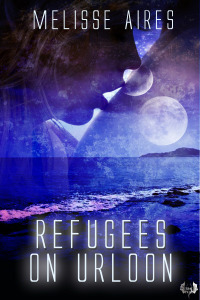
Blurb:
Two weary refugees, two moons and a life-changing fertility festival. Watch out for a whole lot of sensuality.
Under normal circumstances, Svana, non-military maintenance crew, and Captain Liam Ringel, a highly respected military instructor, would never have crossed paths. A sudden anomaly, however, thrusts them into deep space where they are rescued by the inhabitants of an exotic and isolated waterworld, Urloon.
With no rescue forthcoming, the refugees can choose between adapting to the sea or farming the land. Svana is saddened when her budding friendship with Liam changes due to their different choices. However, when they are invited to an alien fertility festival, the Moonfest, they are given the opportunity to create a memory that will impact and intertwine both their futures.
WARNING: Alien fertility festival, aurora lights, dancing alien beasts, body paints and hot pheromones. M/F Sensual.
Excerpt:
“We are lost?” Lost in deep space. A death sentence.
“Think so. We’ll know more when the computers come back online.”
The news was not good and did not get better after the computers came back on. They were deep in uncharted space, and there was no way to know if the jumpstream that had dumped them here would return them to Confederated system space. Though they tried around the clock, they were unable to communicate with anyone. Their small damaged ship was truly alone. They had enough supplies to last for perhaps sixty days. After that, the ship’s fuel would be gone, and they would die in deep space.
Captain Ringel wouldn’t let them give up. They continued with repairs and communication but the mood was quiet, with bursts of anger.
The crew was so young. Svana mourned for their lost futures, and for her own daughter, so far away, whom she would never see again. Many nights, Svana held a weeping young one in her arms, giving what comfort she could.
Going about rote chores in her supply room, Svana heard a shout from her open com. She climbed the ladder as fast as she could. The entire bridge was in a shouting, laughing uproar.
Their distress signal had reached someone. Captain Ringel was talking to the contact in the small conference room. Svana waited with the crew for him to come out, hoping for good news, for a future.
“Urloon. It reached a planet called Urloon,” Lu, one of the junior engineers, said.
“Isn’t that a First World Planet? I remember learning something about Urloon in first school,” another crew member said.
A com tech’s finger glided over the com board. “Yes. Urloon. Settled by first wave Terran settlers but was left isolated for centuries while Terra fought the Terran Civil War. Water… Wow! Water-adapted humans live in domes in the warm seas. They adapted themselves at the DNA level to bare young already adapted to the sea.”
Captain Ringel came back onto the crowded bridge and his smile was blinding. “Urloon, a former Terran colony out on the Rim, is sending a rescue ship. They will be here within twelve days.”
There were twenty days left of life support. The crew erupted into joyous shouts, leaping and laughing so the floor shook. In the tumult Captain Ringel’s gaze caught her own. He nodded slightly, and Svana knew it was an acknowledgment of the work they had done together.
* * * *
Take a shy, chubby, Catholic school girl bookworm from Montana. Hand her a stack of her much older brother’s sci fi and fantasy novels, James Bond books and horror comics. Later, introduce Barbara Cartland and the world of romance fiction.
Get her a teaching job or two in authentic, one room Montana schools, ala Laura Ingels Wilder.
Marry her off to a great guy, move her to a big city in Tornado Alley, then pop three daughters out of her in twenty two months(one set of identical twins).
Then, make her a jinx–every great genre TV show she loves gets the ax– Beauty and the Beast, Dark Angel–and Buffy and Spike NEVER have a happy ending! She gets upset about no romance in the world, and fires up to write her own stories with happy endings.
Throw this all together into a small house in Wyoming, along with a small bouncy dog named Baxter and too many cats, shake constantly and pour it out onto a computer keyboard.
There! You have me, Melisse Aires.
Check out my Refugees On Urloon April Celebration Tour! There will be prizes!











